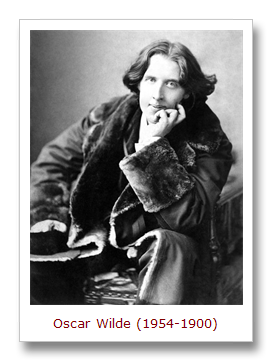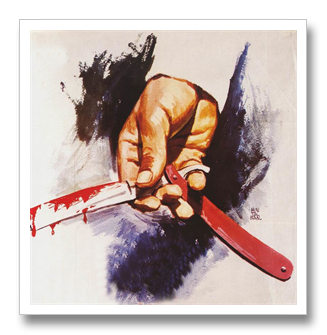On February 13, 1898, the first edition of Oscar Wilde’s now famous poem “The Ballad of Reading Gaol” was published in London by publisher Leonard Smithers.
Those initial copies of the slim volume of poesy did not mention Wilde’s name. The author was given as “C.3.3.,” a reference to Wilde’s cell number while he was in the Reading prison from 1895 to 1897, serving a two year sentence for being a homosexual.
C.3.3. was prison shorthand for Block C, third floor, third cell.
Because of his highly-publicized conviction for “sodomy,” Smithers and Wilde decided to omit the poet’s real name on the first edition of “The Ballad of Reading Gaol,” fearing it might hurt sales.
After the first small run sold out and several subsequent editions also sold well, Wilde’s name finally appeared on the seventh edition.
The most famous and quoted line from the poem is “Yet each man kills the thing he loves.”
But “The Ballad of Reading Gaol” is not some sappy love ode. It is a dark rumination on murder, the harshness of prison life and the execution of a fellow prisoner of Wilde’s, referred to as “C.T.W.” in the poem.
C.T.W. was Charles Thomas Wooldridge, a former trooper in Her Majesty’s Royal Horse Guards in London.
Wooldridge and his young wife Nellie, whose full maiden name was Laura Ellen Glendell, had a short, unhappy marriage. He suspected her of infidelity and abused her. She decided to live apart from him in Windsor.
In March of 1896, trooper Wooldridge begged Nellie to meet him at his barracks in London to discuss reconciliation.
She supposedly agreed, but didn’t show up. So he took a train to Windsor.
On on March 29, 1896, Charlie went to Nellie’s home and cut her throat with the straight razor he’d brought along.
He was quickly arrested, convicted of murder, then sent to the Reading Gaol, which is where Wilde met him.
Wilde apparently liked Charlie and viewed him as a tragic figure deserving of sympathy. But it was a short relationship. On July 7, 1896 Wooldridge was executed by hanging at age 30.
After Wilde was released from prison, he wrote “The Ballad of Reading Gaol.”
It starts with a dedication that says: “In Memoriam, C. T. W. Sometime Trooper of the Royal Horse Guards.”
Here, is a key part of the poem that reflects Wilde’s sympathetic view of Wooldridge:
“He looked upon the garish day
With such a wistful eye;
The man had killed the thing he loved,
And so he had to die.Yet each man kills the thing he loves,
By each let this be heard,
Some do it with a bitter look,
Some with a flattering word,
The coward does it with a kiss,
The brave man with a sword!Some kill their love when they are young,
And some when they are old;
Some strangle with the hands of Lust,
Some with the hands of Gold:
The kindest use a knife, because
The dead so soon grow cold.Some love too little, some too long,
Some sell, and others buy;
Some do the deed with many tears,
And some without a sigh:
For each man kills the thing he loves,
Yet each man does not die.He does not die a death of shame
On a day of dark disgrace,
Nor have a noose about his neck,
Nor a cloth upon his face,
Nor drop feet foremost through the floor
Into an empty space.”
The poem goes on in that way for quite a while. In fact, it’s much longer. But the excerpt above is enough to understand the main point Wilde was trying to make.
I get it. And I recognize the brutal nature of what was considered to be “justice” in the Victorian era. I especially sympathize with Wilde over the absurdly harsh treatment he received simply for being gay.
But I find it hard to feel sorry for Charles Wooldridge.
And, I am hereby dedicating this post on This Day in Quotes to poor Nellie.
* * * * * * * * * *
Comments? Corrections? Post them on the Famous Quotations Facebook page.
Related reading and viewing…



